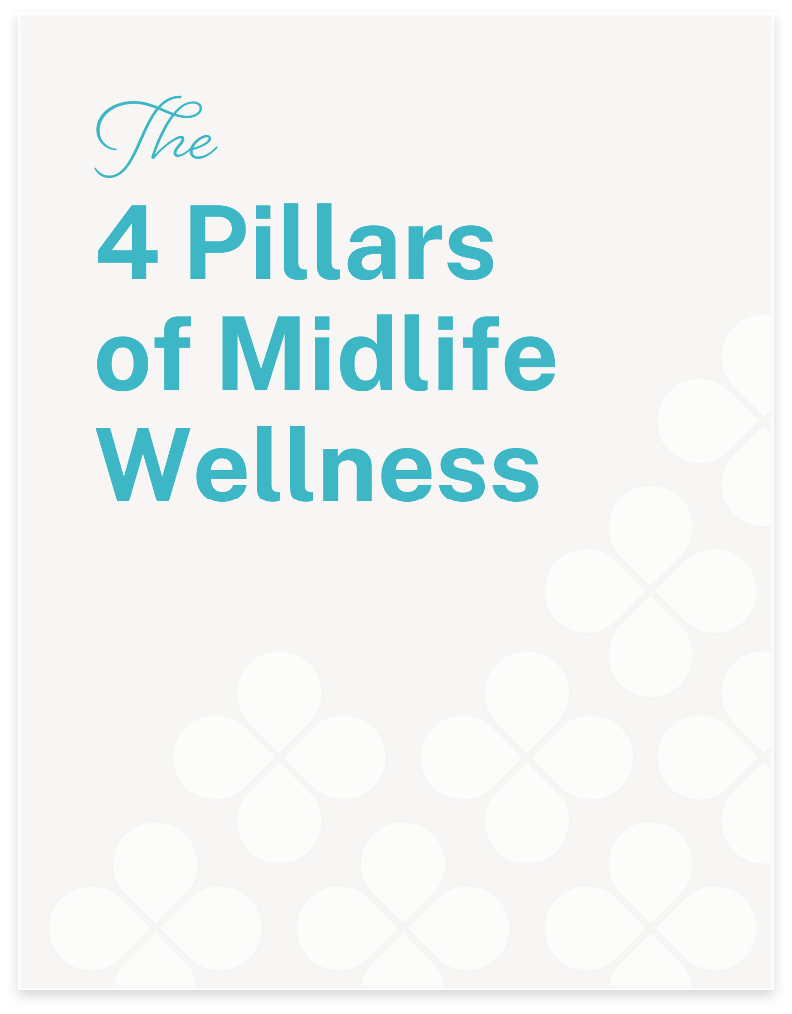The Weight of Menopause

Menopause is a natural, biological event for half the human population for which there is no universal experience. Like puberty or pregnancy, fluctuating hormones contribute to a wide range of symptoms, some more bothersome than others. But worldwide the focus and obsession with weight brings this topic to the forefront of most discussions about menopause.
What causes midlife weight gain and what can you do about it if anything?
This is a frequent question that I get from women who are bothered and baffled by changes in weight as they transition to menopause and beyond. In fact, this question was exactly what I sought to answer for women when I started my professional journey in the menopause field over a decade ago. Here I am, after years of being completely immersed in the research, and I can honestly say that I don’t believe clinicians really understand why women gain weight and certainly aren’t investigating whether weight gain or weight redistribution may play a protective role in aging.
Unfortunately, body dissatisfaction and fear of weight gain are on the minds of many women. Given that these happen to be central symptoms for the development of midlife eating disorders, let’s dive in and unravel what might be going on with body changes. My hope is that with information and clarity, women can feel confident to embrace their best selves, care for their health without bothersome weight concerns, and reclaim peace in their relationship with food and their bodies.
Why do women experience midlife weight gain?
The role of hormones
Most menopause advice these days is focused on weight and body size, often leading women down a path of extreme fitness and nutrition advice tangled up in misinformation. I remember when I first heard that “decreasing estrogen or unbalanced hormones are to blame for midlife weight gain.” Consequently, sellers of supplements, herbal remedies, diet, and exercise strategies often peddle their pills, potions, powders, and books based on this narrative. But, if this were true, then women should be able to prevent or reverse weight gain with the gold standard of estrogen-based hormone therapy, right?
While research on animal models suggests that menopause hormone therapy (MHT) may slightly reduce weight gain during the menopause transition, the animals in these studies gain weight at a slower pace, but still catch up to the untreated animals after 12 to 18 months. In human studies, there’s some evidence that hormone therapy may help decrease abdominal fat accumulation, but the effect is small, and as a result, MHT is not prescribed or recommended for weight concerns.
Furthermore, it is widely acknowledged that perimenopause is often a time when estrogen levels can peak higher than premenopausal years. And, in other conditions that disrupt hormone levels, including depleted estrogen, such as anorexia, low energy availability, and athletic amenorrhea, there is not an equivalent observation of unexplained weight gain or fat redistribution that midlife women experience.
So, if it’s not just estrogen or a hormone imbalance,
then why do women gain weight during menopause?
The role of aging
First, it’s important to recognize that any attempt at simplifying this distressing and complex physiological experience to a single cause is very misleading and is usually wrapped up in weight stigma and bias. Nevertheless, researchers generally agree that women gain an average of 5 pounds during the midlife transition and attribute this to aging, rather than the stage of menopause, while the shift in hormones is associated with an increase in abdominal fat. Even with the latter association, it is not clear if the redistribution in body composition is due to fluctuating hormones (vs absolute levels), decreasing estrogen, or increasing follicle stimulating hormone – again, it’s complex!
At this point, many of you are likely thinking, “If it were only 5 pounds!” Just for validation, most women describe a more dramatic weight change even when it feels like their food, eating, and exercise habits haven’t changed at all. So, beyond the fact that this is very dated research that gets cited over and over, read on to discover some possible reasons for the discrepancy.
Age contributes to weight gain for a couple of reasons. First is the natural loss of lean tissue (muscle) that occurs as we get older. The body also becomes resistant to building muscle as we age (called anabolic resistance). Consequently, women may experience reduced muscle strength and may be less physically active and possibly with less intensity. For example, raking leaves, which used to be a fun afternoon activity now feels like an impossible feat. Add in some arthritis, achy joints, and lack of sleep and it’s easy to see how changes in strength lead to a cycle of less activity contributing to changes in muscle size and strength, and so on.
A second component related to aging is lifestyle. Seemingly insignificant in many women’s minds, but compassionately recognizing that factors such as downsizing, career changes, family stressors, depression, or mood changes (due to life transitions), sleeping less, working longer hours, becoming more sedentary – and, truly enjoying life, eating out more, increased travel and potentially increased alcohol intake may all contribute to subtle changes in food intake and activity.
Certainly, hormone changes and aging in menopause and midlife influence body composition, energy balance, and metabolism, but a history of dieting and weight cycling may also play an important role.
The role of dieting and weight cycling
A factor that is completely dismissed or minimized in menopause literature is the impact of dieting and weight cycling or the practice of losing and gaining weight multiple times throughout life. When people lose weight, along with losing fat, they also lose muscle or lean mass (as well as bone density). When weight is regained, it is often gained back as fat (an adaptive protective mechanism for future “famines”), and because older people have difficulties recovering skeletal muscle, this may contribute to changes in body composition over time. On a side note, once the bone is lost, it cannot be restored.
Dieters are also susceptible to intense hunger and cravings, disordered eating, and eating disorders. In fact, many of the consequences of dieting described in the literature mirror the signs and symptoms of hormonal changes associated with menopause. Leptin, an important hormone that regulates energy homeostasis often decreases after weight loss which contributes to increased hunger. Fluctuations in cardiovascular risk factors, such as blood pressure, heart rate, glucose, and lipids have been reported to increase above normal values when weight regain occurs, regardless of age or stage of menopause.
Could midlife weight gain be protective?
Although surveys show that more than 60% of women over the age of 40 have dieted in their lifetime, what about someone who has never dieted? The ones who have “never had to worry about their weight” but are struggling with unexplained weight gain. On the one hand, perhaps there is a protective role of weight gain. In fact, in a large cohort study of over 6,000 adults, researchers found a protective effect of weight gain among lean postmenopausal women, largely due to a threefold decrease in cardiovascular disease mortality risk.
On the other hand, many of these women describe somewhat of an energy deficit in their younger years for many reasons. Some recognize that busy and often stressful times raising children, working long hours (often on their feet all day), and not having much of an appetite, contributed to simply not prioritizing meals. They were not intentionally undereating, but many women recall just not eating very much. However, as they have come into more relaxed, less busy, and even more enjoyable years, they have found time to sit down and enjoy eating more consistently – and likely more adequately.
What can women do to prevent weight gain – or lose unwanted weight?
To be honest, I used to say, “prevention is key.” It seemed to be “weight-neutral” with a focus on “healthy” eating and regular exercise to prevent midlife weight gain. However, many years of working with a diverse population of midlife women with different lived experiences, I’ve learned that weight gain may be inevitable (I know that some people don’t want to hear that). It’s not uncommon for me to see women eating healthfully and engaging in regular exercise but still seem to experience changes in weight or body composition.
Look, I totally get it! The desire to lose weight is palpable and unbearable at times. I’m not against women wanting to lose weight and in fact I am very compassionate with women who struggle with how they “feel” in their body. But, the pursuit of weight loss is generally grounded in approaches that have harmful consequences physically and mentally.
Moreover, the message “do whatever it takes to lose weight or prevent weight (or fat) gain” remains a message rooted in the fear of fatness and being (or not being) a certain body size. That is usually the deeper issue we need to address versus needing to “fix” our body or weight.
Do we need to do anything?
So, what if weight was not a “problem” to fix or worry about? What if we recognize that menopause and health-related benefits can be achieved with attention to behavior change without any change in body weight? If we weren’t consumed with thoughts and worries about weight, what would (or could) we focus on instead?
Weight does not equal worthiness.
Weight is not a behavior or a lifestyle.
It is a noun, not a verb. It is not something that you “do.”
In the spirit of health and mindful self-care, the following are behaviors that may be meaningful to consider as you shift from weight to well-being and embrace an opportunity to re-assess your health goals at this stage of life.
- Don’t smoke.
- Limit alcohol intake.
- Eat nourishing and pleasurable meals and snacks.
- Ditch the diet and weight rollercoaster.
- Incorporate exercise or movement you enjoy.
- Get the best sleep possible (often easier said than done during this stage).
- Manage stress with spiritual, therapeutic, and/or mindfulness-based practices.
- Surround yourself with encouraging, positive relationships.

Midlife weight and body changes are complex and not easily explained by one thing, such as hormones. Consider the image to the right that highlights ALL the different factors that contribute to weight, health, menopause symptoms, or disease risk. We need to acknowledge that there are many things going on at this stage of life that we may need to tune into!
I care deeply about women recognizing and feeling empowered to dismiss the cultural messages that objectify women’s bodies. Remember that menopause is a natural biological event in a woman’s life and a fabulous opportunity to reassess health goals – as well as values, passions, and causes you believe in.

3 Comments
Leave a Comment

With nearly two decades of experience as a registered dietitian, I’ve gained a deep understanding of the unique health challenges faced by women as they age, particularly during menopause. I hope to help you embrace midlife with confidence and vitality, and to show you that with the right mindset and approach, aging can be a time of great empowerment and joy.

Ready to prioritize your midlife health and wellness? The Four Pillars of Midlife Wellness will provide you with a fresh perspective on food, nutrition, health, and your body, enabling you to embrace your full potential and cultivate a robust sense of well-being throughout midlife and beyond!

Well done, thank you very much!
Does the incidence of obesity then naturally increase after menopause? I am shocked to see how many of my formerly slim high school classmates become obese in their 50s and 60s.
Hi Sandy, This is an interesting question. For all the reasons cited in the reading, it’s difficult to generalize why women (and men for that matter) may gain weight in their 50s and 60s. The other side of this is that weight loss is notable after age 65 and is associated with an increased mortality risk. So, weight shifts could be behavior-related; protective in some way; or possibly, natural for that person’s biology. In general, I think that the public health messaging around “obesity” is not helpful because it suggests that body size is a problem and thus takes us down the path of stigmatizing weight. BMI (for which the naming of “overweight”, “obesity” etc. is based) is being challenged even by #obesitydocs. ~ Val